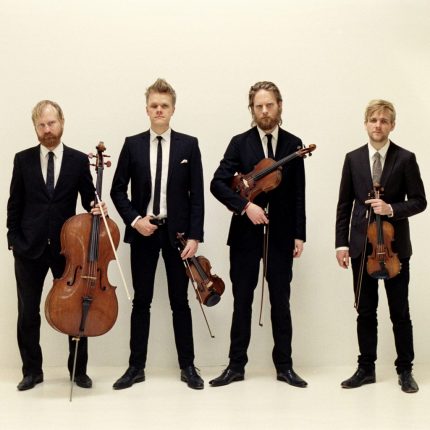Danish Quartet brings dramatic bite to Beethoven program at Mandel Hall

UChicago Presents brought the Danish String Quartet back to Mandel Hall on Friday night. The four Danes made their contribution to the ubiquitous celebrations of the 250th anniversary of Beethoven’s birth, offering a chronological program of three quartets, one from each of the composer’s three “periods.” Their performances were largely nuanced and impactful, providing strong advocacy for revisiting Beethoven’s familiar oeuvre in his sestercentennial year.
Unlike Beethoven’s early piano sonatas where his experiments in form and scope seem clearly like harbingers of things to come, Beethoven’s early string quartets can feel more fixed in a Classical vein. Such was the case with the Quartet No. 2 in G Major, Op. 18 No. 2, which led off the program.
They dispatched the coy imitations of the opening Allegro with grace. Their approach to the ensuing Adagio cantabile may have been a tad extroverted, but the unexpected fast interlude was a genuine buoyant surprise. There was a sense of proportion in the poised reading of the Scherzo, and the closing Allegro molto was robust, albeit losing some sense of the overall architecture.
Next was the String Quartet No. 3 in C Major, Op. 59, no. 2, the last of the three “Razumovsky” Quartets, and the Danish musicians felt more in their element here. The harmonically ambiguous opening felt appropriately disoriented and disorienting, and they dispatched the Allegro vivace’s striding main theme with abundant élan. Here as throughout the evening the ensemble’s balance was thoughtfully calibrated.
The Andante con moto quasi allegretto is a strikingly experimental movement. Cellist Fredrik Schøyen Sjölin launched the movement with a resonant pizzicato, and first violinist Frederik Øland snaked his hypnotic melody to great effect. There are few moments of repose in this music, and the Danes astutely maintained that tension. The Menuetto—the last Beethoven would write in a string quartet—returns to an 18-century sensibility that is particularly striking after the preceding movement, and the musicians brought the same grace here as they did in the Quartet No. 2.
For this performance Stine Hasbirk was sitting in for regular member Asbjørn Nørgaard, who was home in Copenhagen with a new child. Hasbirk launched the closing Allegro molto with vigor, and her counterparts brought immense energy to the movement’s swirling breakneck figurations.
The second half was devoted to Beethoven’s final completed work—the String Quartet No. 16 in F Major, Op. 135—and here the Danish Quartet members were at their best. While the opening Allegretto may seem outwardly untroubled, shadows lurk everywhere in the music, and it is hard not to hear resonances with the composer’s lamentable circumstances at the time. The players highlighted this ambiguity with subtle shadings in their collective timbre.
The Vivace of Op. 135 is striking in its violence, which does not dissipate with familiarity. The musicians brought great angularity to this jagged writing, punctuating the ending with an emphatic exclamation point.
Pathos abounded in the Lento assai, cantante e tranqillo. The ardent violin melody benefitted from Øland’s burnished tone, and a desiccated episode conveyed a deep sense of emptiness. The introduction to the last moment, marked Grave, ma non troppo tratto, saw searing violin wails from Øland and second violinist Rune Tonsgaard Sørensen before launching into the final Allegro. The modernity of this writing remains stunning. The players charted the movement’s unexpected twists and turn expertly, never missing an opportunity to underscore Beethoven’s harmonic ingenuity.
As an encore, the Danish Quartet offered an arrangement of a Scandinavian folk song by cellist Sjölin. In its earnest, limpid simplicity the music was welcome balm after late Beethoven.
UChicago Presents next hosts the JACK Quartet on Friday February 7 at 7:30 p.m. at the Logan Center. They will perform Georg Friedrich Haas’ String Quartet No. 9. https://chicagopresents.uchicago.edu/
Posted in Performances


